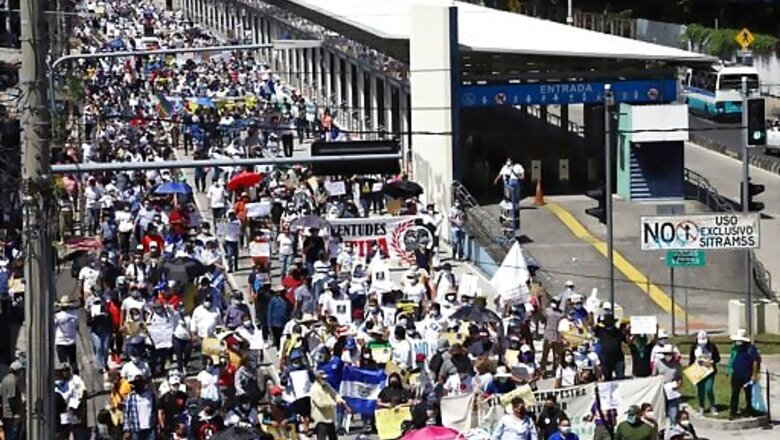
views
SAN SALVADOR, El Salvador: Following a series of protests against El Salvador’s government, the legislature dominated by President Nayib Bukeles party has banned mass gatherings to prevent the spread of COVID-19 but exempted sporting and cultural events.
That apparent contradiction led opposition activists to accuse Bukele of banning protests while leaving other potential super-spreader events untouched.
This is apparently a decree that is disguised as a coronavirus prevention measure, but which is really aimed at one kind of gathering,” said legislator Johnny Wright Sol of the opposition party Our Time.
Bukeles New Ideas party pushed the 45-day ban through congress late Wednesday, arguing protests would still be allowed with social distancing, full vaccinations and face masks.
Bukele, who jokingly changed his Twitter description to Emperor of El Salvador this week, reacted to the accusations Thursday with his usual sardonic style, asking When have we ever banned marches, you clowns?
Protesters in El Salvador have demonstrated against what they call Bukele’s antidemocratic tendencies and his fervor for promoting the cryptocurrency Bitcoin. The president has mocked those concerns, at one point changing his Twitter profile description to the coolest dictator in the world.
Earlier this year, Bukeles party replaced the five members of the Constitutional Chamber of the Supreme Court and the independent attorney general who had balked at several of Bukeles earlier actions.
Soon after, the Constitutional Chamber tossed aside what had long been interpreted as a constitutional ban on consecutive presidential reelection, setting the stage for Bukele to potentially seek a second term in 2024. Bukele has not so far announced plans to seek reelection, but critics assume he will.
The populist president elected in 2019 has maintained high popularity with his vows to stamp out corruption that was rampant among the countrys traditional parties.
But Bukele shocked the nation and many around the world with his announcement last summer that bitcoin would become legal tender alongside the U.S. dollar in El Salvador. The president sold the plan in part as a way for Salvadorans living overseas mostly in the U.S. to send money home to their families more cheaply. It also made him a darling of the bitcoin world.
But the launch has been rocky. The digital wallet Salvadorans were expected to use to perform basic transactions had a glitchy rollout. Some users said they just wanted the $30 the government offered as an incentive. There continue to be concerns that the digital currency, which touts being controlled by no government, will invite criminal activity.
Disclaimer: This post has been auto-published from an agency feed without any modifications to the text and has not been reviewed by an editor
Read all the Latest News , Breaking News and IPL 2022 Live Updates here.


















Comments
0 comment